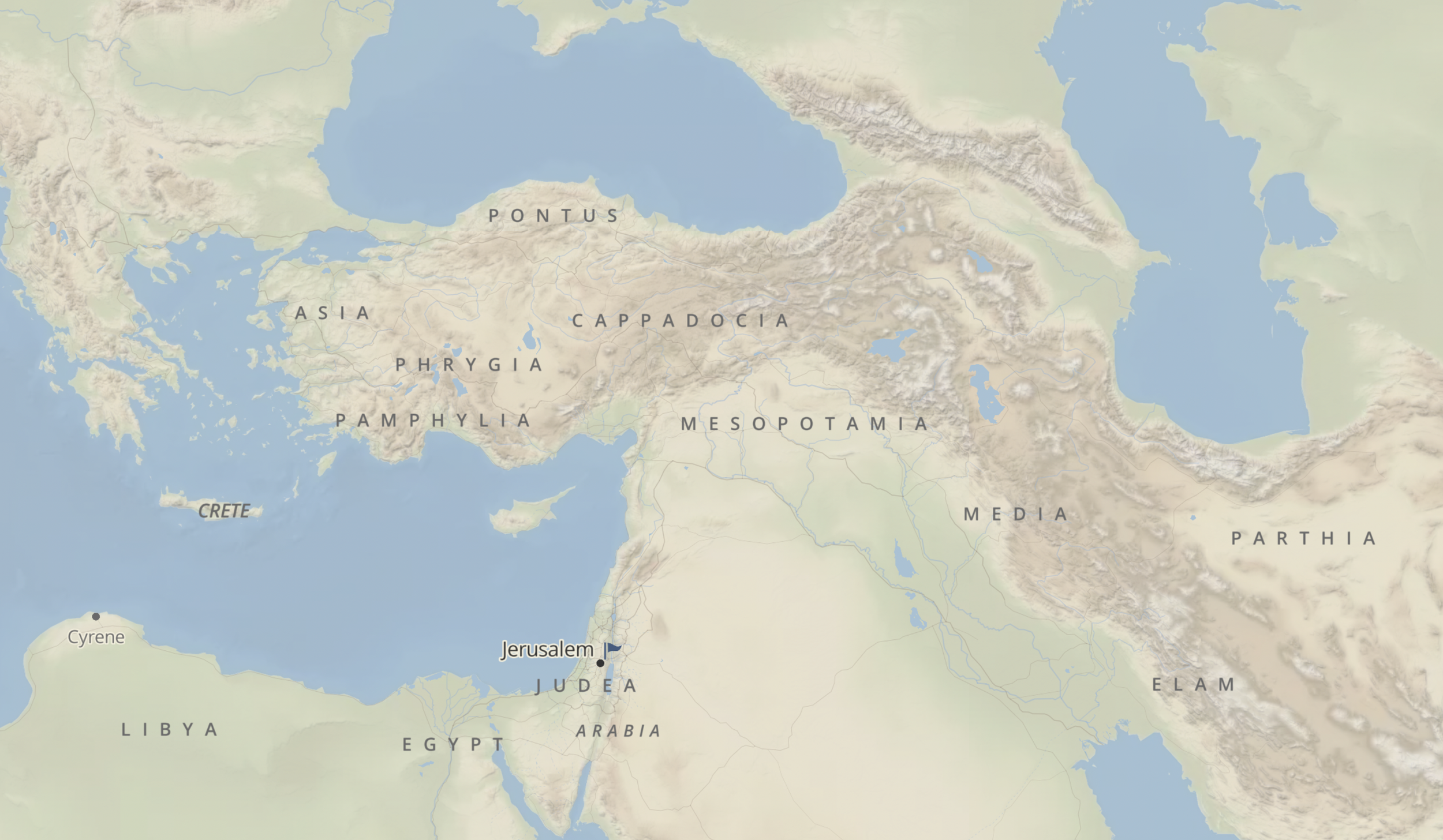Pentecost and the early church, Acts week 1
I had the privilege to co-lead an 8-week study of the book of Acts at my church recently and now that it has concluded, I thought it could be helpful to share the slide deck and speaking notes here. Below you’ll find a carousel containing all of the slides followed by the notes for the first week of the study. Each line break in the notes signifies a new slide.
I will share my other three lessons in subsequent posts here on the site.
















Pentecost and the early church
Main takeaway: The Holy Spirit moved in such power that the course of history was forever altered by the creation of the Church and the obedience of believers
Acts 2.1-13
When the day of Pentecost arrived, they were all together in one place. And suddenly there came from heaven a sound like a mighty rushing wind, and it filled the entire house where they were sitting. And divided tongues as of fire appeared to them and rested on each one of them. And they were all filled with the Holy Spirit and began to speak in other tongues as the Spirit gave them utterance. Now there were dwelling in Jerusalem Jews, devout men from every nation under heaven. And at this sound the multitude came together, and they were bewildered, because each one was hearing them speak in his own language. And they were amazed and astonished, saying, “Are not all these who are speaking Galileans? And how is it that we hear, each of us in his own native language? Parthians and Medes and Elamites and residents of Mesopotamia, Judea and Cappadocia, Pontus and Asia, Phrygia and Pamphylia, Egypt and the parts of Libya belonging to Cyrene, and visitors from Rome, both Jews and proselytes, Cretans and Arabians—we hear them telling in our own tongues the mighty works of God.” And all were amazed and perplexed, saying to one another, “What does this mean?” But others mocking said, “They are filled with new wine.”
the Holy Spirit arrives
In dramatic fashion…a mighty rushing wind, the sound of which filled the house they were in. Imagine the terror, must have sounded like an earthquake was happening.
And if that wasn’t jarring enough, now the apostles were suddenly speaking in languages they didn’t know how to speak!
- The disciples were speaking in actual languages that were foreign to them but were aimed at the many different people groups that had descended upon Jerusalem for the Pentecost festival.
- This is God's way of providing a nice counterpoint to the Tower of Babel where he confused the languages of the people and sent them away. Now he is using the many languages of the people to communicate one singular message: he is worthy of praise because of his mighty deeds.
- All the people here are Jews, so this doesn't signal his intent for the Gospel to go to Gentiles as well, that happens later in Acts, but it is a first clear step in the process of taking the Gospel out of Israel and into the known world.
the crowd
People from everywhere were in Jerusalem for the festival of Pentecost, so the timing of the Holy Spirit arriving is incredibly strategic. Imagine if this happened 10 days after the festival and everyone had already left to go back home. The disciples would have been walking around Jerusalem speaking Latin, Arabic, and a bunch of other languages and dialects and there would have been no one there to understand them. In that case verse 13 would have certainly been the response of most people "Ahh, they're drunk."
Mesopotamia
- Jews here spoke Aramaic
- These would have been descendants of the Jews from the first dispersion from the 10 tribes in the north of Israel in the 8th and 7th century BC
Libya and Cyrene
- Jews had lived continuously in Egypt as far back as the 6th century BC and some Egyptian young men were inspired by their Michael W. Smith cassette tapes and had gone west
So all of these people, from all over the known world are hearing the mighty works of God told to them in their own language and they asked the pertinent question:
what does this mean?
It means that:
- God is a personal God, he cares enough to tell them about himself in their own language
- the Holy Spirit has arrived and with him brought deep and lasting change
TABLE DISCUSSION: Change
What causes change?
Why does change happen?
How does the Holy Spirit change us?
How I define ‘change’:
Change: An outside catalyst introduced into an existing situation or system.
What the apostles experienced was different, a change brought on by the Holy Spirit. And we’re about to read about that change but before we do, here is a quote from Oswald Chambers about the nature of the type of change that the Holy Spirit effects in the lives of believers:
It is extraordinary how things fall off from a man like autumn leaves once he comes to the place where there is no rule but that of the personal domination of the Holy Spirit.
Acts 2.42-47
And they devoted themselves to the apostles’ teaching and the fellowship, to the breaking of bread and the prayers. And awe came upon every soul, and many wonders and signs were being done through the apostles. And all who believed were together and had all things in common. And they were selling their possessions and belongings and distributing the proceeds to all, as any had need. And day by day, attending the temple together and breaking bread in their homes, they received their food with glad and generous hearts, praising God and having favor with all the people. And the Lord added to their number day by day those who were being saved.
early church living
Here we see the immediate effect of the Holy Spirit on the lives of these early believers.
- Breaking of bread - the Lord's Supper and community
- Praying together
- selling their belonging to care for others
- Witnessing signs and wonders as a signal that a new age was dawning
- daily worshipping together
- embracing a humble and grateful posture
- praising God
- favor with ALL THE PEOPLE…how’s that for a bit of counterintuitive fun
- People were added to their number daily
Our God is active.
The Father is actively weaving everything in the world to his intended end, The Son is actively interceding on our behalf at the right hand of the Father, and the Holy Spirit is active in the lives of believers through conviction, encouragement, pruning, and maturing.
TABLE DISCUSSION:
When have you seen the Holy Spirit at work in someone's life?
We see the results of the Holy Spirit's work in our lives by the fruit of the Spirit growing in us:
love, joy, peace, patience, kindness, goodness, faithfulness, gentleness, and self control.
I find it interesting that the result of the Holy Spirit working in us is called ‘fruit’ for this one reason:
who is fruit for?
Is it for the tree that it grows on? Or is it for something else?…someone else?
love, joy, peace, patience, kindness, goodness, faithfulness, gentleness, and self control.
It’s really easy to look at the fruit of the Spirit and think very narrowly or selfishly about it: how do I experience love, joy, peace, patience, kindness, goodness, faithfulness, gentleness, and self control? And focus on that.
But if we look at the fruit of the spirit from the viewpoint of fruit being for the benefit of others, we see that the fruit of the Spirit is most alive and most God honoring when it is given to other people for their sustenance, for their encouragement, and for their growth. It’s not ours to hoard, it’s ours to give.
Brothers and sisters, we have the opportunity to take our fruit and feed the world around us, ushering in the Kingdom as we do so. And when we do that together, we look a lot like the early church did: sharing our resources, eating together, praying together, worshipping together, living life together...all in a way counter to how the world tells us we should live, which people will be unable to ignore.
But this type of living can only come from the change that the Holy Spirit makes in us. It has to be an overflow of what we have humbly received from God.
Change: An outside catalyst introduced into an existing situation or system.
We said earlier that change is: an outside catalyst, introduced into an existing situation or system.